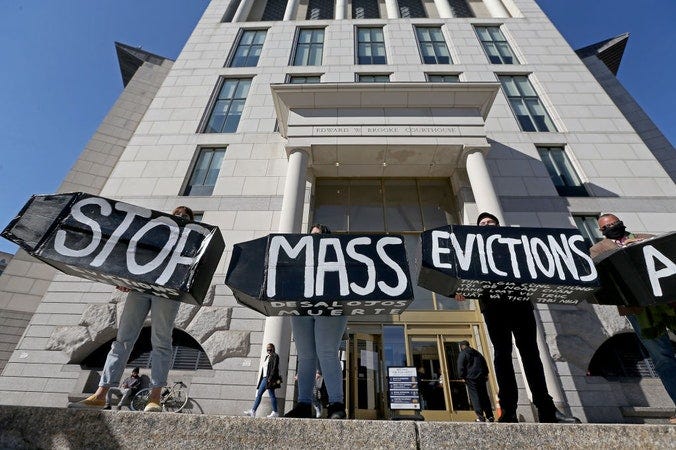Conservative Supreme Court Justices Keep Showing Us Who They Are
So why don’t Democrats believe them?

Late Thursday night in a 6-3 decision, the Supreme Court (SCOTUS) struck down the Centers for Disease Control and Prevention (CDC) moratorium on evictions, ruling the public health agency exceeded its authority.
The court’s decision to overturn the federal eviction moratorium, with as many as 6.5 million households on the verge of eviction, occurred during what is known as the court’s “shadow docket.”
The ACLU’s David Cole wrote about the dangers of the shadow docket in a Washington Post opinion piece last August:
[I]n a much less visible area of its work, commonly known as the “shadow docket,” the court has increasingly split along party lines. Every year, the court considers emergency motions for stays of lower-court orders. It decides these cases without oral argument, often in a matter of days or even hours. In such cases, it typically offers no explanation for its reasoning, even when dissenting justices voice serious objections, and even when the court is effectively overturning the unanimous decisions of lower courts.
Unlike most shadow docket cases, where the court issues brief orders, in this instance, it issued an eight-page majority opinion, which is unusual, as Adam Liptak and Glen Thrush of the New York Times point out, especially in a ruling on an emergency relief application.
Putting aside the fact that the SCOTUS ruling clears the way for mass evictions during a deadly pandemic, as litigator Max Kennerly points out in a thread on Twitter, the decision contains several inaccuracies.
For example, the first page of the ruling, written by the majority without attribution, states:
“The case has been thoroughly briefed before us — twice.”
In actuality, there have been two emergency motions on eviction moratoriums on the court’s shadow docket with minimal briefings, and there were no oral arguments on the merits were made before the court. The court also made the following dubious assertion:
Whatever interest the Government had in maintaining the moratorium’s original end date to ensure the orderly administration of those programs has since diminished.
It is difficult to understand why the court would take the position that the government’s interest is now “diminished.” Just one day before the court’s decision, we learned that of the $46.5 billion in rental aid allocated by Congress through the Emergency Rental Assistance Program, states have only distributed $5.1 billion, or about 11 percent.
This modest level of distribution illustrates that, if anything, the government has a continuing interest in the administration of its rental assistance program.
Kennerly also notes the speed at which SCOTUS overruled the CDC, compared to its glacial pace on issues against Republican interests. Requests for Trump’s tax returns and state emoluments lawsuits, for example, remained unresolved until after the end of the Trump presidency. The length of time from the CDC’s order to the SCOTUS decision overruling the agency was less than one month.
To be fair, Democrats must share some of the blame for the eviction mess. As the court points out, Congress knew of the approaching expiration of the moratorium and provided no new legislation to extend it:
Congress was on notice that a further extension would almost surely require new legislation, yet it. failed to act in the several weeks leading up to the moratorium’s expiration.
While the speed of the SCOTUS decision is surprising, the outcome is not. As I noted earlier this month, with just a few exceptions, Democrats, who control the House, Senate, and the White House, displayed no urgency in addressing the looming crisis as the moratorium’s July 31st expiration approached.
As Justin Gomez and his colleagues at ABC News reported at the time, when Biden pushed the CDC to come up with a rationale for the extension, his clear intent was to buy time for Democrats (and renters), knowing the extension probably would not hold up under scrutiny:
“I’ve sought out constitutional scholars to determine what is the best possibility that would come from executive action of the CDC’s judgment. What could they do that was most likely to pass muster, constitutionally? The bulk of the constitutional scholarship says that it’s not likely to pass constitutional muster, number one. But there are several key scholars who think that it may and it’s worth the effort,” [BIDEN] said.
Biden reasoned that even if the courts overturned the CDCs order, more funds would be in the hands of struggling renters by the time the issue made it up the food chain.
Now that the court did what anyone paying attention should have anticipated, every Democrat with a cell phone is tweeting performative lamentations. Never mind the fact that they are the ones charged with preventing the catastrophe that is about to unfold.
Since winning control of Congress and the White House, Democrats have inexplicably behaved as though it’s still 1999. Meanwhile, the court has gutted voting rights, slow-walked investigations into the last administration’s malfeasance and outright criminality, and signaled its intent to overturn Roe v. Wade.
As a progressive Democrat, I derive no pleasure from putting the party on blast. But honestly, with a court controlled by six men vetted by the Federalist Society, what exactly did Democrats think would happen?
I want to believe Congress will rush to pass a permanent eviction fix. But with the filibuster still in place and Democrat’s reluctance to properly wield the power we’ve given them, I am not optimistic.




